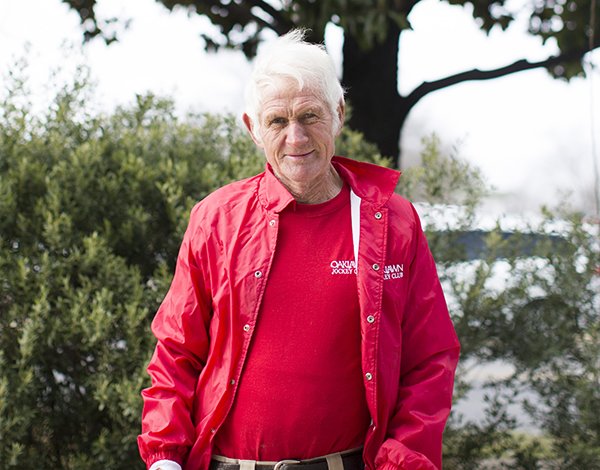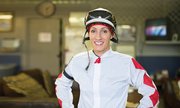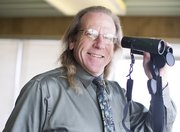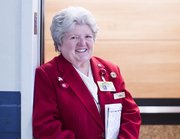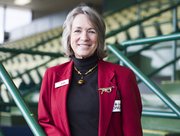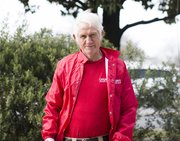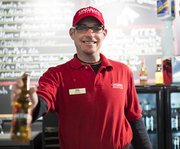The horses may take center stage at Oaklawn, but it’s the people who give the track its appeal and make race fans feel like they are stepping back in time. The draw is employees who have worked at the track for as many as 40 years. It’s the clusters of families punching the clock together. Employees who aren’t family might as well be. The result is a warm, welcoming atmosphere as everyone from ushers to bartenders is happy to accommodate those celebrating the spectacle that is horse racing.
Then there are the regulars — the serious bettors — and the pack of loud youngsters who care more about the party than the race results. One of Oaklawn’s lead bartenders, Mitch McDaniel, says there isn’t better people watching in Arkansas than at Oaklawn, and we think he might be right.
Here’s a little about some of the personalities who make the track so special.
Jenna Joubert
As one of Oaklawn’s three female jockeys, Jenna Joubert knows what it’s like to stand out
Jenna Joubert has been around racetracks since she was 5 years old.
A racetrack opened near her hometown just south of Minnesota’s Twin Cities, and Joubert’s family made the trek on warm weekends, setting up lawn chairs and propping open beer coolers in the grassy lawn in the middle of the track.
Her aunt and uncle owned a few horses, and soon her parents did, too. It wasn’t long before racing was in Joubert’s blood for good.
Now, her family says a prayer every race day for the girl who grew up to be one of a handful of competitive female jockeys in the U.S. — one of three riding at Oaklawn this season.
As a professional jockey, Joubert’s schedule is grueling. Three- or four-month stints at tracks in Oklahoma City; Des Moines, Iowa; and Hot Springs throughout the year, barely long enough to call one place home. Every morning, Joubert joins the other jockeys in their routine of volunteering to exercise horses for owners, hoping that she impresses them enough that they'll let her ride their horse in a race. That’s how jockeys make their money.
“It’s three days before the actual race that we know which horse we’ll ride,” Joubert, 29, says. “I’d say 70-80 percent of the time the horses we get on race day, we’ve never seen or been on before. It’s crazy, right? But a lot of time that’s the case.”
On a good day at Oaklawn, Joubert has just 11 minutes to get to know the horse that will make the difference between a payday and going back to the jockey room empty-handed.
“When it’s cold, you have even less,” Joubert says. “You know pretty quickly if they have a really strong mouth or don’t steer that well or have an antsy personality.”
Despite female jockeys having a presence on most racetracks for 20 years or more, Joubert says misconceptions still exist about the way women can handle horses. Some people will say a woman can’t possibly have the muscle to handle a powerful horse. But Joubert says it’s not about that.
“Being 110 pounds, there is not one of us in here, even the guys, that has the strength to manhandle a 1,200-pound horse,” Joubert says. “It’s about finesse and relating to the horses. A lot of women riders listen more to the trainers. We ride a smarter race instead of being showy.” (evz)
Jeff “Money” Taylor
Beating the odds: Career gamble pays off for Taylor
Jeff “Money” Taylor has made a living dealing with odds thanks to an early, risky roll of the dice.
In 1983, Taylor was a civil engineer fresh out of Arkansas Tech University. However, after six months he decided to pursue a career in horse racing. He wrote a letter to the Daily Racing Form, and without any experience other than routine trips to Oaklawn with his college buddies, Taylor was hired to chart races at Louisiana Downs in Bossier City, La.
The move may not have made sense to some, even Taylor, but he went with his gut on the decision, which has proven to be a good move as the 54-year-old is now a 30-year veteran of the horse racing industry.
“It was obviously a risk. I think of myself as fiscally conservative,” says Taylor, whose wife, Sunny, works in TV at the track. “But I just knew I loved racing so much it was something I had to pursue. It is actually kind of out of character for me to take that kind of risk. That risk was the biggest gamble of my life.”
Charting, which Taylor found out that summer in 1983, is the statistical part of horse racing. It’s comparable to what a football stat crew does. One person calls out the action of each horse, each quarter of a mile, and the other records the information. According to Taylor, charting has been recorded in the Daily Racing Form since 1894.
As technology has evolved, the information can now be accessed almost immediately online via equibase.com. Equibase and the Daily Racing Form “joined forces” in the late 1990s, Taylor says.
As soon as a race is run at Oaklawn the raw data is sent to Equibase corporate offices in Lexington, Ky., where it is processed and available for bettors in minutes.
“The software assimilates all of the data with weights, the jocks and the mutual payoffs. That is what the past performance is based off,” Taylor says.
Those who pick up the Daily Racing Form the next day can see how a horse ran in its last race. A short commentary by Taylor is also included.
Oaklawn holds a special place in Taylor’s heart. Dormitory mates encouraged him not to take afternoon classes on Tuesdays and Thursdays so he could join them on routine trips to the track. The first day he attended a race, he felt the magic.
“Brand loyalty is big at Oaklawn, more so really than any other place I’ve ever worked,” Taylor says. “One of the reasons is, it is a short meet, and it focuses on the race itself. Some of the other meets I’ve worked, I don’t want to say they’ve been mundane, but maybe routine. But Oaklawn is a celebratory meet. It’s a festival every day. They call it the Fifth Season for a reason. When Oaklawn is running in the state of Arkansas, it has a great vibe to it.” (no)
Chris Zwahlen
It may be a tiny office, but to Chris Zwahlen, the Oaklawn elevators are home
It was a trip to Germany that first brought Chris Zwahlen to work at Oaklawn.
A former student was graduating college overseas, and Zwahlen wanted to earn a little extra money and take a trip to see the ceremony.
She was hired part time as an elevator attendant, and eight years later, she’s still loving every trip up and down the five floors she covers.
Perched on a cushioned stool just inside the doors, Zwahlen is a familiar face to many race regulars, and a helpful hand to those who are visiting for the first time. Every race day at 10:30 a.m. she starts her shift, pushing buttons and doling out advice. Second floor mezzanine and sports tavern, third floor lower terrace, fourth floor jockey club and then the press box. Up and down, every day.
“I missed a few weeks a couple seasons ago,” Zwahlen says. “I was shocked at how many people, even from out of town, tracked down my phone number to check on me.”
People see Zwahlen so often that some consider her a good luck charm. Some bettors have to pat her head. Others rub her earrings, or insist that she wear certain jewelry to bring them good vibes.
The hardest part in having an elevator as your office is the space. A crowded elevator with people who have had a few drinks can be tense. And an elevator with claustrophobics is even worse. In her eight years in the elevator, Zwahlen has only been stuck once.
“A group of University of Arkansas students were on here with me and we got stuck between the roof and the fourth floor for 45 minutes, and a student started hyperventilating,” Zwahlen says. “I didn’t panic, we started telling stories. They got us out.”
And they got her a new elevator. (evz)
Jean Wood
Putting on that red coat means helping people at Oaklawn
First time at Oaklawn and don’t know where to go? Maybe you’ve been before, but can’t seem to find your seat. No worries. Head straight for the red-coated ushers and they’ll help you figure it out.
Though she’s been an usher at Oaklawn for close to a decade, Jean Wood is still the newest usher at the racetrack. The average tenure for an usher is probably close to 20 years, she says.
Wood got the job at Oaklawn a year after her daughter, Lauren, started working there. Now, Lauren — 25 years old and the youngest usher at Oaklawn — has been part of the team for nine years, and her mother’s been there for eight. They work next to each other in connecting parts of the complex. “On a slow day we get to commiserate, and on a busy day, we get to help each other,” Wood says.
A day in the life of an usher starts off with helping people find their seats. There’s a lot of shuffling people from one building to the next, helping folks find their boxes and checking tickets.
“I myself am a little lenient,” Wood says. “If there’s a group of people and everyone has their ticket, and one or two can’t find theirs, I know they just misplaced it, and almost every time they’ll come [find me] with it later.”
Wood’s stint as an usher isn’t her first brush with horse racing — she and her husband used to train horses in Chicago, visiting Oaklawn annually on their race circuit, and now her husband serves as an agent for jockeys. The couple bought a house in Hot Springs in 1993 and home-schooled their children, which allowed for travel during the year.
Over 20 years later, this is actually going to be Wood's first year sticking around Hot Springs. “We’re going to see how we like living in Hot Springs year-round. I think we will,” she says. “There’s a lot of racetrackers, and trainers and stuff, who do own their homes here; it’s a smaller community and it’s beautiful.”
One thing about being an usher — once you’ve done it for a few seasons — is you see a lot of the same faces from week to week, then year to year. “A lot of the boxes, and season ticket holders, they’ve had those seats for generations,” she says.
And for the most part, Wood just likes the opportunity to help people.
“When I put the red coat on, then it gives me license to walk up to anybody and speak to them, or see if I can help,” she says. “It opens up a door.” (sm)
Frank Mirahmadi
The voice of calm (but sometimes animated, too)
An Oaklawn race is hectic. Thoroughbreds topped with jockeys in multicolored jerseys storm around the dirt track, kicking up clumps of earth. Trackside bettors scream at the galloping mass, raised-high fists clutching betting tickets. Inside, there’s the bustle of humanity darting for new bets and more drinks. In this chaos is the voice of Frank Mirahmadi, track announcer for the park. Mirahmadi might enliven his speech calling a race, but not unnecessarily so. He injects thrill when needed but otherwise just accurately relays the race’s actions.
Get it right: What horse is where, what horse is charging on the outside, what horse is fading. Being exact in a sudden din of disorder.
“The most important thing, without any doubt — it’s not even close — is to be accurate,” says Mirahmadi, who is in his third year as the track announcer at Oaklawn. “It’s all about accuracy. People want to know where their horse is in the race at all times so it’s important to stay on top of the action and to accurately identify every horse. And to make sure no matter how short the race is, every horse gets a call.”
Following accuracy, the other chief responsibility of a track announcer, Mirahmadi says, is helping the crowd enjoy themselves. “You want to create excitement when it is there, but you don’t want to manufacture it. If it’s an exciting race, you make it exciting. If not, you can’t just make it exciting and pretend it is.”
A native of Los Angeles, Mirahmadi’s father started taking Mirahmadi to tracks at an early age. He was hooked. “I took an immediate love to the sport,” the 46-year-old says. “I used to get autographs from the jockeys. I used to listen to the announcers. And I used to try to pick horses. It was just so much fun for me. I became fascinated by the announcing of it. I think it was meant to be.”
Following college, Mirahmadi worked for Norton Utilities (he was the software company’s ninth employee and still receives a Christmas card every year from company founder Peter Norton), but Mirahmadi kept in touch with the track. In 1992, Mirahmadi called his first race at Hollywood Park, and his first full-time track announcing job came in 1996 at Florida’s Hialeah Park. He also worked at Louisiana Downs in Bossier City, La., before becoming Oaklawn’s fourth announcer since its opening.
Mirahmadi replaced Terry Wallace, who had called races at Oaklawn for 37 years. But Mirahmadi was immediately comfortable in his new role.
“I have felt at home as soon as I arrived,” says Mirahmadi, who also calls races for the California Authority of Racing Fairs and works for horse racing channel Television Games Network. “It is just such a great place. Having traveled so much throughout my career, to me it is all about getting to a place like Oaklawn.
“I love the people of Arkansas. I’ve never met nicer people than here.” (ss)
Johnnie Breckling
Grounds manager has kept an eye on Oaklawn’s greenery for 44 years
Some of the best days spent at Oaklawn are those on Derby Day in April, when the infield is open and the azaleas are in bloom. Look around, there’s more: dogwoods, magnolias, oak trees and pines, carefully trimmed hedges and a manicured lawn.
This is all thanks to grounds manager Johnnie Breckling, who, for the past 44 years, has helped make the grounds at Oaklawn what they are today.
Breckling, 77, has been working with plants ever since he was 15. His father, a German immigrant, began Breckling’s Nursery in 1922 in Hot Springs. “I’ve worked with trees and plants all my life,” he says.
In the ’70s, Breckling and his father began doing landscaping for Oaklawn through contract work, which Breckling continued for almost 30 years until he was hired on full time as the grounds manager 15 years ago.
Landscaping and tending to the same grounds for decades means getting to see the fruits of your labor, which is rewarding, Breckling says. “If you visit the barns, you’ll see pine trees that are 30, 40 feet tall. To watch those grow is really great.”
From January to April, Oaklawn’s grounds serve as the backdrop for the races; but after the track slows down following Derby Day, that doesn’t mean Breckling gets to. “Those eight months [after racing season] are maintaining the grass, keeping the flowers watered, keeping the trees growing.”
Oaklawn isn’t the only spot in Hot Springs Breckling has landscaped. He’s worked in some capacity at the Landmark Building, the Arkansas School for Mathematics, Sciences and the Arts (formerly St. Joseph’s Catholic Hospital), the Mid America Science Museum and many residences, including the home of gangster Owney Madden. Breckling is also responsible for some of the landscaping at Mercy Hospital in Hot Springs, where he was a cancer patient eight years ago, and where a painting of him, titled “Arkansas Grit,” hangs in the emergency room to honor his strength and his contributions to the hospital. Breckling’s daughter, Martha — who has worked in purchasing at Oaklawn for six years now — says everyone who sees the portrait instantly recognizes the sun-hardened features and soft eyes of her father.
How does Breckling, who worked alongside his own father for decades, feel about sharing days at work with his daughter? “It’s marvelous, really,” he says.
“[Oaklawn’s] really got a lot of good folks here. It’s a big family unit that really I enjoy.” (sm)
Mitch McDaniel
Fully prepared: Veteran bartender enjoys Oaklawn atmosphere
Mitch McDaniel knew something wasn’t right. A young man at the raised table near his bar never had a beer in front of him until another young man brought him one.
McDaniel called for security and had one of his barbacks follow the men out the doors to the track at Oaklawn.
The lead bartender’s sharp eye caught not one, but two, 21-year-old men serving alcohol to a pair of 18-year-olds. The four men were taken by security and given a warrant check. The 18-year-olds were barred from the track until they turn 21 and the 21-year-olds received a one-year ban.
The McRae native has more than 20 years of bartending experience that dates back to his college days tending bar in the French Quarter while he was in school at the University of New Orleans. There, McDaniel developed a knowledge of drinks while also learning to keep his head on a swivel.
“I learned a lot. I think that time in New Orleans prepared me for other jobs,” McDaniel says. “I got to experience Mardi Gras and Southern Decadence and meet people from all over the country and the world. You learn a lot of drinks we don’t know about [in Arkansas] in [New Orleans].”
McDaniel also earned a horticulture degree while learning the art of bartending. He headed home to Arkansas and worked in landscaping with Little Rock’s Cantrell Gardens for 12 years. McDaniel had bartended on the side but got more serious about his part-time gigs five and a half years ago when he moved to Hot Springs. He wanted to escape Little Rock crime and, while he looked at moving to Eureka Springs, he settled on Hot Springs because its tourist season is longer. After a year of driving back and forth to work in Little Rock, he quit his job at Cantrell Gardens and began doing interior design, some landscaping projects, condo cleaning and more bartending to cobble together a living.
McDaniel turned to Oaklawn last year when he needed some extra cash. He began working nights at the Derby Bar during simulcast season. Management noticed business picked up during his shift and promoted him to the lead bartender, a management position, working days during the live racing season at the new beer garden, which features craft brews.
“It’s good, extra money and good people watching,” McDaniel says. “It’s fun to be out here and be busy with the track. I love the horses.”
In just three weeks at the beer garden, McDaniel says some of his regular Derby Bar customers found him, and he had already developed a new group of regulars.
McDaniel says customers like his knowledge of the beer selection and professional courtesy. He is quick to send them to the Derby Bar if he knows he doesn’t have the drink they want. And while serving up drinks and answering questions with a smile, he still manages to be alert.
“I have to keep my eyes open, and I feel like I have more responsibility in being the lead, too,” McDaniel says. “So none of my other employees get in trouble.” (no)
